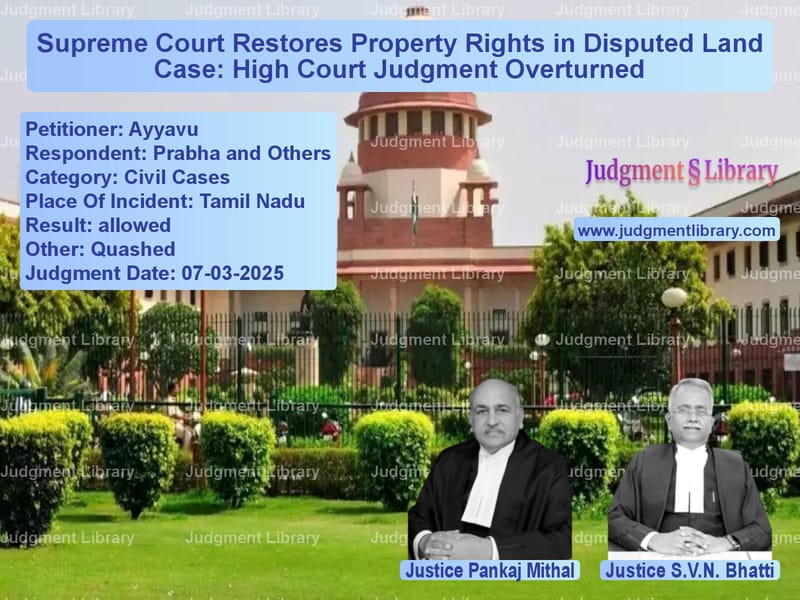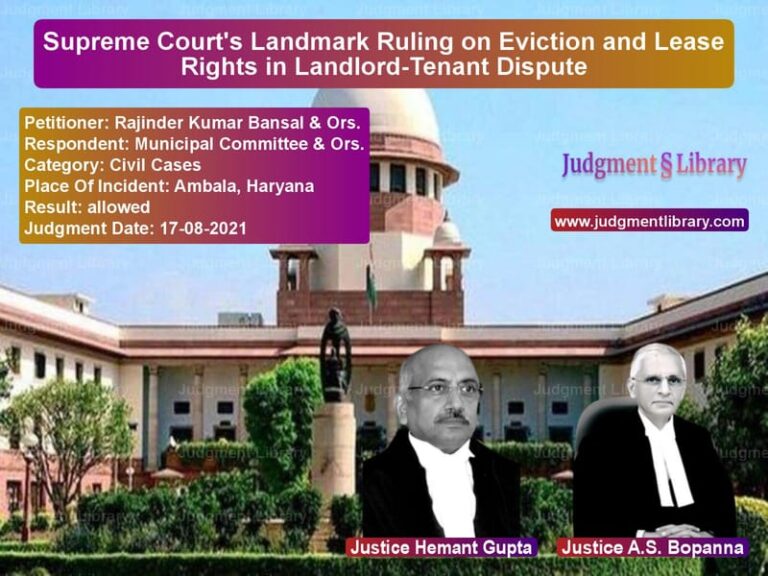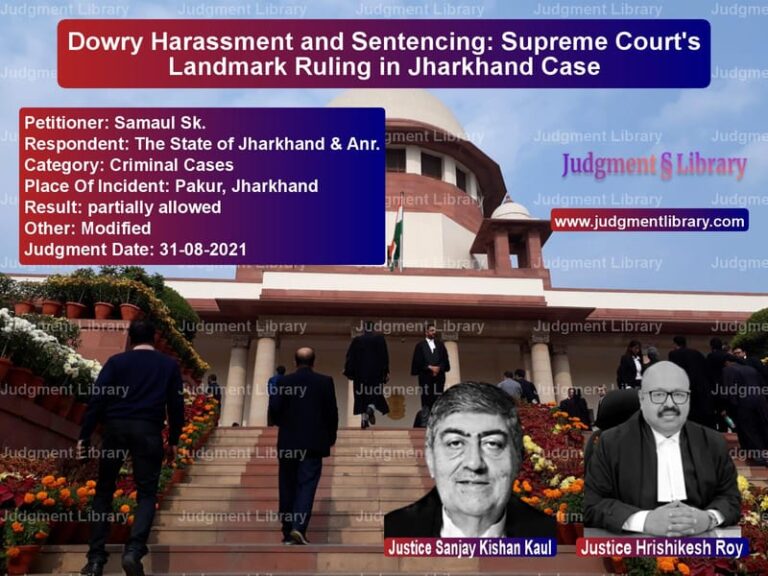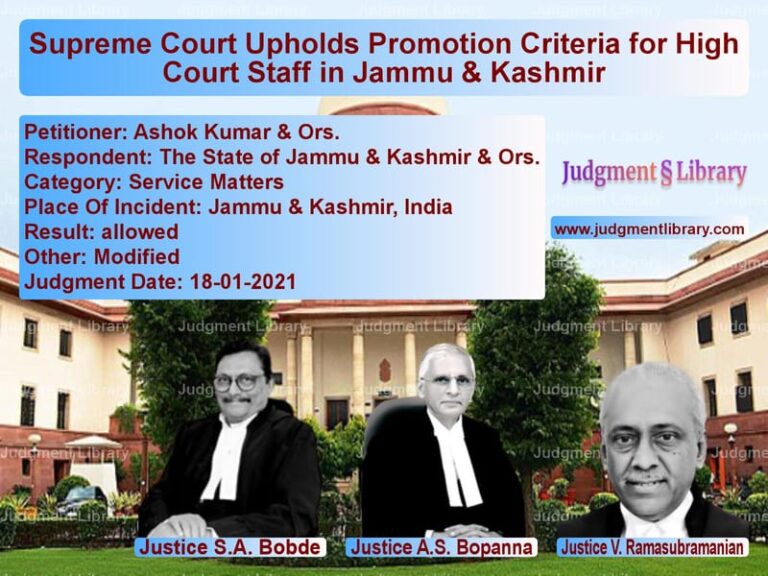Supreme Court Restores Property Rights in Disputed Land Case: High Court Judgment Overturned
The Supreme Court of India recently delivered a significant ruling in Ayyavu v. Prabha & Ors., overturning a High Court decision that denied the plaintiff’s claim to property ownership. The judgment clarified key legal principles concerning property disputes, the interpretation of sale deeds, and the role of legal evidence in determining rightful possession.
Background of the Case
The dispute revolved around ownership of a plot of land in Tamil Nadu. The plaintiff, Ayyavu, filed a suit in 1998 before the Principal District Munsif, Kuzhithurai, seeking:
- A perpetual injunction preventing the defendants from interfering with his possession of the land.
- A mandatory injunction allowing the removal of unauthorized construction allegedly erected by the defendants.
The disputed property consisted of two portions:
- Item 1: 16 cents of land.
- Item 2: 5 cents of land, including an old well.
The plaintiff claimed ownership based on a registered sale deed dated August 23, 1988, which he argued included the entirety of the disputed land. However, the defendants, particularly Respondents 1-3, contested this claim, arguing that:
Read also: https://judgmentlibrary.com/supreme-court-rules-on-lease-agreement-dispute-dda-vs-s-g-g-towers/
- The well and the surrounding 1¼ cents of land were never sold to the plaintiff.
- The disputed portion remained with the original owner, Mariyammal, who later transferred it to the Government of Tamil Nadu through a settlement deed executed on August 6, 1998.
- By a Gram Panchayat resolution dated August 13, 1996, the property was developed for public use.
Trial Court and Appellate Court Findings
Trial Court’s Decision
The trial court dismissed the plaintiff’s suit, reasoning that:
- The plaintiff’s sale deed covered only 21 cents of land, while the total area in dispute was 23 cents.
- The disputed well was located outside the boundaries of the plaintiff’s sale deed.
- The plaintiff failed to prove his claim of ownership over the well and surrounding land.
First Appellate Court’s Reversal
The plaintiff appealed, and the Sub Court, Kuzhithurai, overturned the trial court’s decision. The first appellate court found that:
- The defendants’ claim of ownership rested on a settlement deed that was not a registered document.
- The defendants failed to prove the validity of the Gram Panchayat resolution vesting ownership in the government.
- The sale deed executed in 1988, along with the Commissioner’s Report dated December 16, 2003, supported the plaintiff’s claim that the disputed portion was part of his legally acquired land.
High Court’s Intervention
The defendants challenged the appellate court’s ruling before the Madras High Court, which reversed the decision and upheld the trial court’s findings. The High Court reasoned that:
- The plaintiff’s sale deed only covered 21 cents, leaving out the disputed 1¼ cents.
- The suit should have included a prayer for declaration of ownership, rather than just an injunction.
- The plaintiff failed to provide documentary evidence proving ownership beyond the 21 cents mentioned in his sale deed.
Supreme Court’s Analysis and Key Observations
1. Errors in the High Court’s Reasoning
The Supreme Court identified flaws in the High Court’s judgment, particularly regarding:
- Interpretation of the Sale Deed: The plaintiff’s deed contained specific boundary descriptions that clearly included the disputed land.
- Failure to Recognize Continuous Possession: The plaintiff had remained in possession of the disputed portion, and the Gram Panchayat had never exercised ownership rights over it.
- Misplaced Reliance on the Settlement Deed: The defendants’ claim relied on a settlement deed that lacked legal validity and was never properly executed.
“The plaintiff’s vendor did not retain any portion of the land. The sale deed boundaries confirm that the disputed portion was conveyed. The High Court erred in overlooking these aspects.”
2. Importance of the Commissioner’s Report
The Supreme Court placed significant weight on the Commissioner’s Report, which:
- Mapped the plaintiff’s property boundaries accurately.
- Confirmed the plaintiff’s continued possession.
- Contradicted the defendants’ claim that the disputed land was separately owned.
3. Legal Principle: Mere Injunction vs. Declaratory Relief
The High Court had dismissed the suit partly because the plaintiff had not sought a declaratory decree. The Supreme Court clarified that:
“Framing of the suit was not an issue before the Trial Court or the First Appellate Court. Non-suiting the plaintiff on this ground is unsustainable.”
Final Judgment
The Supreme Court allowed the appeal, setting aside the High Court’s ruling and reinstating the first appellate court’s decision in favor of the plaintiff. The Court ruled:
“The impugned Judgment in Second Appeal (MD) No. 437 of 2010 is set aside. The Civil Appeals are allowed. No order as to costs.”
Implications of the Judgment
- Clarity in Property Disputes: The judgment reinforces the principle that courts must closely examine sale deed boundaries and possession records.
- Burden of Proof in Property Claims: The ruling highlights that defendants seeking to dispute ownership must provide legally valid documentary evidence.
- Role of Lower Courts: The decision underscores the need for High Courts to respect factual findings of trial and appellate courts unless there is a clear error.
Conclusion
The Supreme Court’s ruling in this case is a landmark judgment in property law, reaffirming that clear sale deeds and possession records cannot be overridden by vague and unregistered claims. The decision protects rightful owners from unlawful encroachments and ensures that judicial processes are not misused to create ownership disputes where none exist.
Petitioner Name: Ayyavu.Respondent Name: Prabha and Others.Judgment By: Justice Pankaj Mithal, Justice S.V.N. Bhatti.Place Of Incident: Tamil Nadu.Judgment Date: 07-03-2025.
Don’t miss out on the full details! Download the complete judgment in PDF format below and gain valuable insights instantly!
Download Judgment: ayyavu-vs-prabha-and-others-supreme-court-of-india-judgment-dated-07-03-2025.pdf
Directly Download Judgment: Directly download this Judgment
See all petitions in Property Disputes
See all petitions in Landlord-Tenant Disputes
See all petitions in Specific Performance
See all petitions in Judgment by Pankaj Mithal
See all petitions in Judgment by S.V.N. Bhatti
See all petitions in allowed
See all petitions in Quashed
See all petitions in supreme court of India judgments March 2025
See all petitions in 2025 judgments
See all posts in Civil Cases Category
See all allowed petitions in Civil Cases Category
See all Dismissed petitions in Civil Cases Category
See all partially allowed petitions in Civil Cases Category







